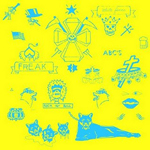|
|
 |
Dusted Reviews
Artist: White Fence Album: White Fence Label: Make a Mess Review date: Apr. 16, 2010 |

|
|
|
 |
White Fence, Tim Presley’s bedroom psych project, is either deeply allusive or derivative, depending on what kind of mood you’re in, steeped in references to all the great late 1960s mind-benders, from Syd Barrett, to the Who, to the Byrds, to Skip Spence. It’s a wispy, fuzz-fogged, solitary affair, layered in that home-taper way where the pieces fit together only loosely, like furniture bought at rummage sales that doesn’t quite match.
Even so, it’s hard to dismiss and harder still to pry off the music player, with startling moments of lyrical clarity (the very lovely “Sara Snow”) lodged amidst bursts of genial cacophony. It might be a lost 1960s classic, if you overlooked the mad punkish bits and tried not to hear the programmed drumming. It has not just the chords and guitar-wants-to-be-a-sitar twang, but the tarnished purity of that decade.
White Fence is a one-man project, built, one imagines, in bits and riffs as Presley has time, between his gigs with Darker My Love, Strange Boys and (at one time, not now) as part of Mark E. Smith’s pick-up band circa Reformation Post TLC. As a result, it has the deeply eccentric free-seeking-ness of a music that, perhaps, no one ever expected to release to the public. Most of the time, this is wonderful and odd, as on the all-out rocker “Destroy Everything” or the very Who Sell Out psych pop of “The Gallery.” There are one or two occasions, though, where things are inchoate and hard to penetrate. The chaotic mash of samples near the album’s end (guitar hiss, a dog barking, people talking) seem more like sloppiness than creative free-association.
Almost everything is viewed through a thick murk of home production, an aura that can turn dirty at times (“Baxters Corner” which somehow evokes both Swell Maps and Piper-era Floyd) and radiant at others. The fuzz, in itself, is not a bad thing, but it’s remarkable how much you focus when it clears, even for the space of a two- or three-minute song. The first instance of clarity is the really luminous, unhurried gorgeousness of “Sara Snow,” which could be an off-track from the Hollies or the Byrds, if it were not so ever-so-slightly skewed off center. The second, “Tildas” leans more in Syd Barrett’s solo direction, or possibly, later, to Robyn Hitchcock, just wiry and unconventional enough to avoid preciousness, though winking a little at its fey pop turns.
There’s hardly a minute of this debut that doesn’t remind you of something else, but never in an objectionable, copying sort of way. What you’re hearing, if you like 1960s psychedelia, are the skewed, very personal observation of a guy who has the same records as you do, who loves them deeply, but would never stoop to xeroxing them. Allusive I’d say, not derivative. But then, after listening to this album all week, I’m in a pretty good mood.
By Jennifer Kelly
|







